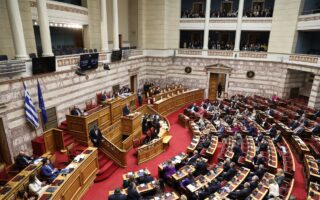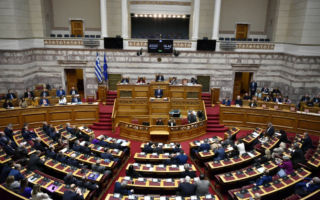Government plans next steps after marriage bill
Mitsotakis looking ahead to a full agenda, with education set to monopolize the public debate

The government welcomed the passage of the bill on same-sex marriage on Thursday with feelings of relief and satisfaction and wants to put the controversy it created behind it. The satisfaction may come from the fact that finally two thirds of ruling New Democracy’s parliamentary group voted in favor, something that seemed out of the question some two months ago. At the same time, however, it has to deal with the remaining third who either voted against or abstained from voting.
The antidote to this, government sources have stressed, is to immediately close the issue of same-sex marriage, which the government knew from the beginning was difficult, and move on to the next phase, which includes a full agenda, since the higher education bill is next in line and will monopolize the public debate. Despite the many “leaks” from the 52 MPs, the government believes that the bill will be good for the country.
“The general conclusion is that the process went very well,” a government source noted, referring to the positive publicity the country received in the foreign press, which covered the bill’s passage with glowing reports. Tellingly, on Friday, during Prime Minister Kyriakos Mitsotakis’ visit to Germany, where he participated in the Munich Security Conference, he was greeted with warm applause because of the bill’s passage.
Moreover, at the round-table discussion he attended on global monetary policy, he was hailed as “the man who put Greece’s finances in order and he deserves congratulations also because same-sex marriage has just been passed in his country.” For his part, Mitsotakis called it a “landmark decision for the country,” saying he was proud to have introduced the bill.
The logic of turning the page is what the government wants to implement with the 52 MPs who moved to abstain and vote “no,” including former Prime Minister Antonis Samaras, who deconstructed the government’s narrative in favor of the bill. Government sources reiterated that party discipline was not imposed for the vote and that MPs voted according to their conscience.
However, given that most of the lawmakers who abstained or voted against have nothing to look forward to, such as a possible entry into the cabinet, this could foment internal opposition, led of course by Samaras, whose differences are now the norm rather than the exception on a number of issues.





